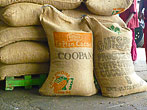Cocoa speculators cash in on Côte d'Ivoire conflict

Cocoa speculators are among the few to benefit from the crisis in Côte d'Ivoire, as disruptions to the supply chain drive up global prices of the commodity, writes Khadija Sharife.
Some weeks ago, a Pambazuka article written by Pierre Sané, former secretary general of Amnesty International, disclosed the relations between Côte d'Ivoire’s new president, Alassane Ouattara, and Loïc Folloroux, stepson of the head of cocoa and coffee-trading Armajaro's Africa division. Outtara's banning of cocoa exports was seen as serendipitous to the company's fortunes, particularly Armajaro's leading cocoa speculator, Anthony Ward. Known as 'choc finger', Ward – unlike other speculative traders – does his homework on the science of production, directly gathering intelligence on volume: Building weather stations, financing a small global army of ‘chocklings’ to count and monitor pods, primarily in Côte d’Ivoire – supplying 40 per cent of global cocoa.
Like Marc Rich, Ward was a graduate of Philips Brothers, shaped to 'make markets' from every commodity the earth can yeild, specifically those considered 'inelastic'. As Ward himself stated, 'the investment in cocoa and other agricultural products as an asset class is crucial, because everyone recognizes that the world is growing and food and water are really going to be in shortage.'
Initially part of the 'Columbian Exchange', during the discovery of the New World, cocoa was considered both a currency and delicacy. In the United States, home to the world's major cocoa-seeking multinationals such as ADM, cocoa trading began in New York in 1952. The crop was said to have been introduced to Côte d'Ivoire in 1902, and in Ghana, another leading producer, just before that.
These days, the annual US$5.6 billion raw cocoa 'growers' industry supports five million farmers (indirectly, 60 million families) globally. Cocoa trading, especially given the limits of production (some 3 million or so tonnes), was a relatively simple business, allowing for futures trading to inform the market comprised of buyers/importers and sellers/exporters – until deregulated speculators, vying for possession of titles, hijacked the market.
This is particularly true for Britain, where GBP denomination of cocoa contracts, traded on the NYSE LIFFE (London International Financial Futures Exchange), leads the price of cocoa for over 38 weeks each year. Yet, as the FAO (Food and Agriculture Organization) disclosed last year, just two per cent of all commodities futures end with an actual physical delivery. Nor is trading is not limited to actual quantity available, but instead to market prices structured on 'unlimited' quantities (i.e.: in 2010, certificates were traded for 60 million tonnes of cocoa, speculation falling into the several hundred billion).
One simple solution would be to protect farmers by limiting speculative trading of soft commodities. But the City of London (itself a corporation) hosts the largest agricultural commodities trading market in the world and speculation, alongside banking, remains the driver. Speculators, primarily interested in 'possession' of contracts, stand to cash in when the price of cocoa rockets. Though they are traded all year round, cocoa contracts arrive five times a year (in March, May, July, September and December), with traders either going long (if they feel price will rise from initiated position) or 'short' if they feel the price will drop.
The NYSE LIFFE does not publish information identifying speculators from those wanting physical deliveries, nor other crucial details such as who (persons/companies) control which positions, for how long, etc. Allegedly through various 'pet traders', Ward (forecasting intensifying scarcity in recent years, particularly from 2010 onward), acquired an estimated 50,000 tonnes of cocoa futures contracts at US$2,300 per tonne (2010) entitling him to 10 tonnes per contract or 500,000 tonnes. He closed out on half, keeping the remaining 50 per cent. Later, he took delivery of the 250,000 tonnes, warehousing it (at a cost of more than €1.5 million per month, doubled when factoring in cost of interest rates). Though the cocoa ban is no longer is place, for the past few months, as export flows were disrupted in real and imagined ways, Ward experienced the scarcity he sought to render the massive investment – 7 per cent of global production, worthwhile and very fortuitous indeed. For more on the fascinating Ward his passion for cocoa, this article in the UK’s Financial Times is worth reading (registration required).
BROUGHT TO YOU BY PAMBAZUKA NEWS
* This article was amended on 19 May 2011 to include the paragraph:
Like Marc Rich, Ward was a graduate of Philips Brothers, shaped to 'make markets' from every commodity the earth can yeild, specifically those considered 'inelastic'. As Ward himself stated, 'the investment in cocoa and other agricultural products as an asset class is crucial, because everyone recognizes that the world is growing and food and water are really going to be in shortage.'
* Please send comments to [email protected] or comment online at Pambazuka News.
* Khadija Sharife is southern Africa correspondent for The Africa Report.
